

Mukti Meeting Regarding a Framework for Value Education
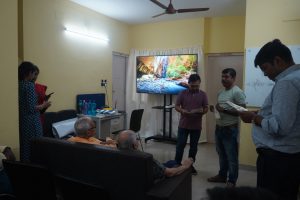
On 15th October 2022, a special meeting was organized at Mukti’s Garia office, Kolkata, under the initiative of Mukti, with the support of “Vivek Pathe”. The meeting was regarding the formation of a specific framework for imparting values and its evaluation process.
Mukti has already started imparting value education among students through the teachers of Mukti Support School. How scientifically such education can be imparted, and how the important elements of this special education process can create a healthy positive impact in the life of the student – this is a primary measure of this objective. The meeting was organized with the aim of obtaining the considered opinion of eminent personalities on this specific issue.
Special guests at the event were the honorable Dr. Partha Chattopadhyay and Dr. Miratun Nahar. Dr. Chattopadhyay is a renowned Jibonbadi writer and the leader of the Jibonbadi movement. He has been an eminent journalist in his earlier life. Dr. Nahar is a social activist, and a former professor of philosophy, is a prominent speaker and a well-known face in various socialist movements. She is the principal of Vijaygarh Vidyapeeth. and the state level. Other distinguished guests were Mr. Tapas Kumar De – Chairperson of the Principal Teacher Teachers’ Association (West Bengal); Dr. Rita Bhattacharya – Former Sanskrit Professor and Researcher of India Theory;, Psychologist Ms. Nupur Sen; Mr. Partha De (on behalf of the Association for India’s Development). On behalf of Mukti, Founder President Mr. Shankar Halder, founding member Mr. Madhusudan Bairagi, Mukti Secretary Mr. Satyajit Roy, Mr. Debabrata Halder, Ms. Srijita Sarkar, Ms. Rajashree Dhar (joined virtually), Mrs. Pampa Karmakar, Mrs. Gargi Chakraborty, Mr. Soumen Bhattacharya, Mrs. Shreya Das, and Mr. Subhojit attended the meeting. From “Vivek Pathe”, the Founder Editor Mr. Samar Kumar Das, Mr. Mahananda Halder, Mr. Dipanbita Basu Sarkar, Mr. Bhriguram Halder, Mr. Shravani Halder were present. Mrs. Nandita Jayaraman attended on behalf of both Vivek Pathe and Mukti.
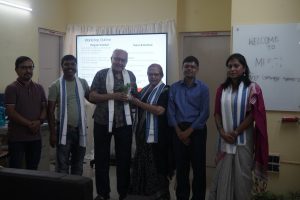
At the beginning of the meeting, the guests introduced each other. Mukti honored the guests with a sash and a plant.
The meeting started auspiciously with the opening speech of Mukti Founder President at 11.20 am. Paying respect to the guests, he gave a brief speech about the purpose of organizing the meeting. He specified how, through the practice and application of values, the great social workers present in the meeting have made the lives of themselves and the people close to them meaningful and worthwhile. By keeping such examples in front of them, can the next generation follow a specific path and educate themselves in values and strive for spiritual and social development? He urged the attendees to start a constructive discussion on understanding and properly evaluating the approach to value education. Along with this, he requested the gathering to move forward with the implementation of another far-reaching idea behind this initiative of Mukti. Namely, through joint initiatives and cooperation, the creation of a framework for value education will stand the test of time. Even after years a century, if there is a decline in values in society, then this specific framework should be able to guide civilization, society and individuals.
Along with the request to discuss this idea, he appealed to everyone to express their opinion about the need for discussion before the start of the meeting, i.e. before starting to think about creating a specific framework for teaching values, he posed the question to all the members present in the meeting – How relevant is the inclusion of value education along with traditional teaching? Like the various other social problems of the present times, is the degradation of values a real issue?
The discussion began by seeking answers to these questions.
As the first speaker, Honorable Dr. Partha Chattopadhyay presented his valuable speech – he briefly explained the data and analysis of his research on values to all. While explaining, he said that values change over time and place, i.e. Indian values and American values at the same time may be different and values and morals are deeply related to each other. As a result of a long study, he listed 70 values that are fixed in space or time. The external statement of values may change with time and place but its underlying interpretation will always be limited to the 70 values mentioned. Along with this, he said that childhood is one of the ideal times to learn values. Parents/ guardians and teachers play important roles in teaching children values. While explaining their role, he said that it is only through their combined efforts that values can be inculcated in a child’s mind.
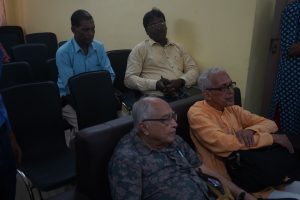
Dr. Miratun Nahar expressed her opinion as the next speaker in this context. While explaining what a sense of value means to her, she narrated some examples from her personal life where she clarified what the sense of value personally means to her by analyzing the behavior of her domestic helper. Through this example, she illustrated that regardless of social position, caste, religion, or gender, values are a sense of responsibility or conscience in people which cannot be given by creating frameworks. In our daily life, the proximity of various good people around us awakens this sense in us. Values cannot be taught and are not changeable over time or place. Values in life can be established only when there will be no difference between our inner and outer selves. She believes that the two principles that guide a life of values are – Truth and Appearance. If we can consciously follow these two things in life, then maybe we can all become firm in our values. Regarding the degradation of values, she said it has definitely happened in our present society and the socio-economic situation has a big role to play in this.
Eminent Psychologist Dr. Nupur Sen briefly presented her valuable speech to us. Although childhood has been identified as one of the ideal times for learning values, she tried to clarify the idea by referring to a case history of her working life to illustrate that the practice of values or the realization of values and its application in life is not limited to any particular age. We need to be more optimistic about our inner possibilities. There is no need for parents or guardians to be disappointed or afraid if a child is deprived of the opportunity to receive this education during childhood. At any age, we can start practicing values in our own lives. The ability to perceive or accept values decreases with age, but if we have the will, we are able to instill values in ourselves at any moment in life.
The next speaker Dr. Rita Bhattacharya highlighted the definitions of values expressed by eminent social reformers and presented her personal thoughts about values by analyzing the essence of each definition. According to her extract, a sense of dignity is closely related to values. Achieving self-betterment through inner processes is the significance of values in our lives. She concluded her speech by mentioning values in various Hindu religious texts and examples of its influence and spread in the past Indian life journey to inspire our future life as well.
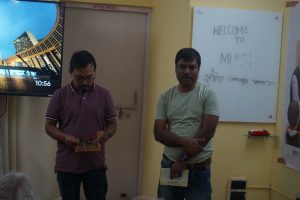
Next. Headmaster Mr. Tapas Kumar Dey expressed his opinion. He defined values through his personal life perception. What he defines as values is – accepting responsibility for the outcome of all events that happen to one. He shared his self-realization with everyone by referring to an experience in his personal life. The first step in understanding values is to understand ourselves and analyze our impact on the events that happen around us. It is through this process that we can gradually move towards self-purification and self-love. Apologize to yourself for an unintentional incident and thank yourself for an ethical act. When we are able to put this process into consistent practice, we become personally educated in values. Along with this education, he presented his own ideas to everyone on a way to follow them. If we are able to take action by maintaining three aspects in doing any work in life, we can incorporate values education in every step of life. Namely, is what we are doing fair? Will I be harmed by this work? Will this action of mine harm others? If we can make a final decision judging by these three questions in every work of our daily life, then it will be possible to preserve the values of individual life as well as overall values in society.
Then Mr. Partha Dey, on behalf of the Association for India’s Development organization (AID), through his short speech gave a small example of how he defines value education. He shared his experience through a small incident in the life of the tribal community. At work, he met a member of the tribal group who was giving information about various livelihood problems in their community due to deforestation and the problem of meeting the food needs of wild animals due to deforestation. The people who are dependent on the forest are suffering from extreme food shortages due to deforestation, they have to survive by eating only one meal a day. Despite this kind of severe poverty, that man still thinks about the plight of elephants. He said, the small stomach of a human being can be filled with a one-time meal, but the stomach of an elephant is much bigger than a human; then how much suffering does an elephant encounter in search of food?!!
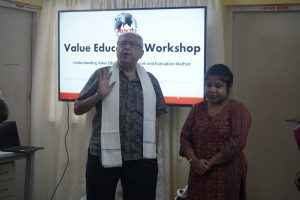
His words prove that people who live in the jungle thousands of miles away from the so-called education system are a thousand times ahead of the so-called civilized society in terms of consciousness. No one taught these people that sense. By sharing this experience, Mr. Partha conveyed the message that a sense of value or a sense of consciousness, whatever it may be called – is an instinctive feeling that may not always be inculcated in life through traditional education and maybe it is not possible to determine a specific policy for it.
Mr. Samar Kumar Das delivered his speech on behalf of Vivek Pathe. He clarified the definition of values on the path of consciousness, that is, in Swamiji’s ideology. Values are actually the sense of life, the consciousness of our heart, the awakening of our conscience and the sense of our existence that is the means by which we evolve from animality to humanity and from humanity to divinity. That is, we all have divinity within us and if our sole aim in every activity of life is to develop and manifest that divinity, then we can naturally incorporate the essence of values into our lives.
After the first stage of discussion, the next stage i.e. the process of collectively searching for the reasons for the degradation of values began.
After a long discussion, the main reasons identified were –
- Our current financial situation,
- The negative impact of media (especially social media) on our daily lives,
- Addiction to the colonial way of life,
- The rise of capitalist ideology,
- Effects of caste (class) differences in society,
- obvious economic disparity,
- The current shortage of people of ideal character who can set a positive example for society.
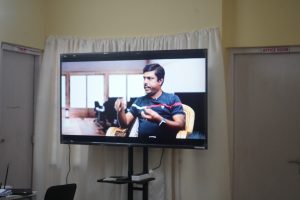
Possible Solution –
- Moral education and values education should be imparted to children in a very simple process with the help of teachers and parents; initiatives should be taken to teach various effective habits and behaviors.
- People who are living a life of values should become the subject of discussion for students. Parents should take a special role in this process. Only the so-called high-profile people holding high positions in society will not be examples of an ideal person. People of any livelihood, any educational qualification or any religion, caste or gender, who are living their lives with dignity, transparency and honesty, should be presented as examples to society as ideal people.
- Regarding the solution, Mr. Mahananda Halder said, we don’t need to be selfless and it is almost impossible for people to do anything selflessly. But we have to seek overall interest in any work beyond our self-interest. This will encourage us to express our thinking in the right direction.
- Ms. Dipannita Basu Sarkar said that if we can bring the tendency to carry the truth with us in any situation into a practical place, then it will be possible to balance the negative side in ourselves to a large extent.
- Mr. Partha Dey and others advocated making the statement of the preamble of the Indian Constitution a core issue of practice in the life of the common man. This statement encourages us to rise above all differences and inculcate a sense of brotherhood and respect for one another. So it will become one of the ways in instilling values or a sense of consciousness.
After the initial discussion of these solutions, the program ended with the promise that next time there will be a discussion of these solutions in more detail. The attendees would continue to discuss and research in detail about the specific solutions and the process of obtaining solutions. They will simultaneously decide how to evaluate all those processes and proceed toward implementation.
After this discussion, the meeting ended by exchanging thanks and respect for each other.
Project Activities
- A village for independent and enterprising women (A VIEW) (5)
- About Mukti (4)
- Accreditation (14)
- AGM (63)
- Agriculture Reforms (124)
- Ambulance Service (2)
- Amplifying Community Voices (67)
- Awards (15)
- Awareness and Empowerment (137)
- Awareness drives (61)
- Bio-Village-Kankandighi (10)
- Careers (14)
- Chick Rearing Programme for Marginalised Women (16)
- CHILD (23)
- Climate Resilience River Embankment (46)
- Covid-19 (74)
- Cultural Shows (7)
- Cyclone Aila (13)
- Cyclone Amphan (44)
- Cyclone Bulbul (30)
- Cyclone Dana (3)
- Cyclone Remal (12)
- Cyclone Response & Recovery (90)
- Cyclone Tolerant Houses (15)
- Cyclone Yaas (57)
- Disaster Recovery (264)
- Editorial (58)
- Editorial by Abir Biswas (1)
- Editorial by Amit Kumar Dey (3)
- Editorial by Ananya Chatterjee (3)
- Editorial by Ankita Kothiyal (4)
- Editorial by Debabrata Halder (1)
- Editorial by Dr. Alokananda Ghosh Sengupta (2)
- Editorial by Kasturi Bakshi (1)
- Editorial by Monami Mitra (1)
- Editorial by Nandita (3)
- Editorial by Pampa Karmakar (1)
- Editorial by Pranay Patra (1)
- Editorial by Prof. Pradeep Ray (1)
- Editorial by Ranitendranath Tagore (1)
- Editorial by Sankar Halder (14)
- Editorial by Satyajit Ray (7)
- Editorial by Sohini Mehta (1)
- Editorial by Sonamon Basu (3)
- Editorial by Soumitra Bose (2)
- Editorial by Subhankar Basu (1)
- Editorial by Supriya Sarkar (1)
- Editorial by Supriyo Banerjee (3)
- Editorial by Ujjwal Maity (2)
- Education and Enrichment (422)
- Environment and Resilience (127)
- Featured Activities (24)
- Gram Clinic (9)
- Health Water & Sanitation (97)
- HOPE (10)
- Impact Stories List (109)
- Integrated Development (219)
- International Management Institute (IMI) (2)
- Jal hi Kal (6)
- Kitchen Gardening (16)
- Livelihood & Enablement (220)
- MCDF (119)
- Medical Camp (45)
- MIT (8)
- MKSS (50)
- MSS (147)
- Mukti Academia (5)
- Mukti Academy (2)
- Mukti Craft (18)
- Mukti Cultural (2)
- Mukti Employment Exchange (MEE) (9)
- Mukti Fresh (15)
- Mukti Gram - Egra (11)
- Mukti Gram - Purbashridharpur (170)
- Mukti Green Defense in Sundarbans (11)
- Mukti Yoga (12)
- Mukto Dhara (2)
- Northumbria University (2)
- Obituary (6)
- Observance Days Celebration (53)
- Organic Farming & Training Support (45)
- Pond Rejuvenation (20)
- Prerana (1)
- Prerna (4)
- Projects For Mukti Wide (7)
- Queen Mary University of London (1)
- Rights and Special Needs (113)
- Run for Cause (13)
- Run4SafeFood (7)
- SDF (6)
- Shahoshini (9)
- Skill & Enterprise Development (21)
- Smart lab (5)
- Social Stock Exchange (2)
- Social Workers' Convention (1)
- Sundarbans Green (SUN-G) (15)
- Sunderban development fair project (4)
- Surya (13)
- Sustainable Agriculture Movement (63)
- SWAS-2-0 (19)
- Swastha Shongini (33)
- Swavalamban Accelerator in Sundarbans (SWAS) (21)
- Tour for Cause (45)
- TSS (201)
- UDAAN (8)
- Uncategorized (99)
- University of Calcutta (1)
- Value Education (12)
- Valued Partners (3)
- Vocational Trainings (15)
- VOICE (14)